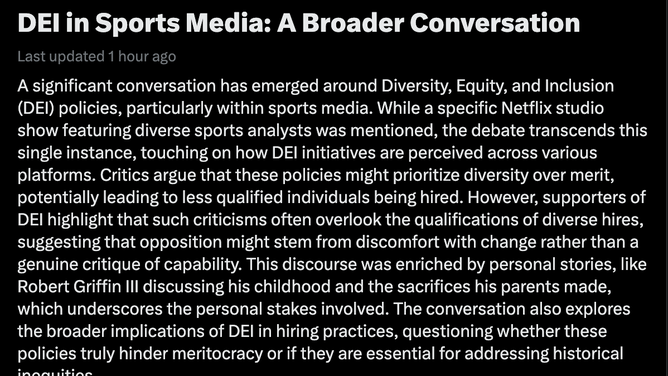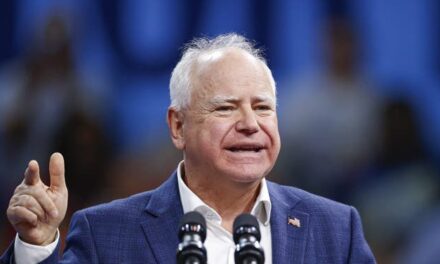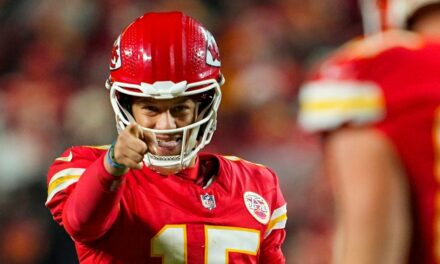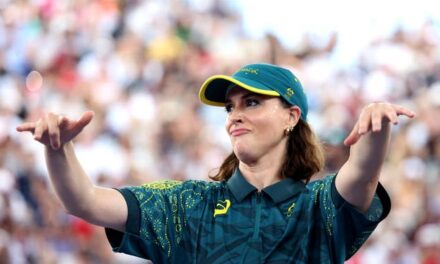We support our Publishers and Content Creators. You can view this story on their website by CLICKING HERE.
Netflix made it through its first of many Christmas Days as the exclusive broadcast partner of the NFL. The app did not crash and hardly buffered, a stark improvement from its disastrous showing during the Mike Tyson-Jake Paul fight in November.
However, viewers still had reasonable gripes about the presentation, particularly about the personalities who appeared on the broadcast.
The topic “DEI in sports media” continues to trend on X a day later. The trend is a reference to a post by Blaze columnist Jason Whitlock about Netflix’s NFL studio crew on Wednesday afternoon.
“The full-blown DEI studio show. I’m sure Netflix is quite pleased with itself,” Whitlock posted above a video of a discussion from the set.

Note: Drew Brees, a future Hall of Fame quarterback, was only a guest for a few segments. The actual NFL on Netflix studio team consisted of host Kay Adams and analysts Mina Kimes, Robert Griffin III, and Manti Te’o.
Did DEI play a role in Netflix’s casting of those three analysts? If not, we struggle to find the logic.
Te’o is a failed former NFL linebacker, most famous for a catfishing ruse in which he fell in love with a woman who did not exist. Griffin also failed in the NFL and was recently fired by ESPN in part because of his clownish behavior on-air and on social media. Kimes never played in a game of football.
And yet, Netflix chose that trio over respected NFL analysts like Kurt Warner, Steve Mariucci, Tedy Bruschi, and even Dan Orlovsky, who struggled as a player but is widely regarded as the top day-to-day NFL analyst.
Netflix wasn’t feeling the white men this season.
The inherent flaw in DEI is that the concept elevates people to positions of which they are not worthy. For such a large platform, Netflix certainly didn’t cast its analysts based on worth.
As expected, Griffin turned the broadcast into a fanboy session for Lamar Jackson, whom he refers to as his “little brother.” On Wednesday, Griffin gushed over Jackson during segments that didn’t even involve the Ravens quarterback. At one point, Adams turned to Griffin to say, “You really are his hype man.”
Griffin proceeded to tweet about Jackson over and over, and over and over again during commercial breaks from the set. Put simply, RGIII isn’t an analyst. He’s a groupie.
And casting him as an analyst for any NFL studio directly undermines the credibility of the broadcast.
Manti Te’o could have pretended to be interesting. He didn’t. He added little to the discussion and was painfully boring.
At the risk of Mina Kimes accusing OutKick of spreading “horrible lies” about her and inciting “racist harassment” against her family – we maintain that she is a talented television personality. She has the chops to be a more successful Bomani Jones. However, she’s not an NFL analyst.
No other personality, male or female, who did not at least play college football holds the title of NFL”analyst.” Kimes is the only one. In fact, she never even covered the NFL on the ground.
Kimes is a social media star who networks hold up as some code-cracking football mind because she studies film. And several times on Christmas Day, Netflix turned to her to break down the Xs-and-Os of the game.
John Madden would be aghast.
Consider that Netflix struck deals to borrow talents from ESPN, NFL Network, CBS, NBC, and Fox Sports. And the bosses chose Kimes, RGIII, and Te’o. So, DEI or corporate doofuses-ness? Likely some combination of both.
Granted, we ought to give Netflix credit for passing on Ryan Clark. Say what you will about Kimes and Griffin, at least they are not afraid to work with conservative women.
Finally, nepotism might be the only social concept more nauseating than DEI. And color commentator JJ Watt repeatedly accusing the Chiefs of “holding” his little brother TJ Watt, when he was clearly not held, from the broadcast booth was also quite cringe.
Netflix could have used some more buffering on Christmas Day.

 Conservative
Conservative  Search
Search Trending
Trending Current News
Current News 





